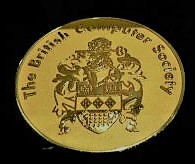| BCS Lovelace Medal | |
|---|---|
 | |
| Awarded for | "Individuals who have made an outstanding contribution to the understanding or advancement of Computing." |
| Country | |
| Presented by | BCS, The Chartered Institute for IT |
| First awarded | 1998 |
| Website | Official website |
The Lovelace Medal was established by BCS, The Chartered Institute for IT in 1998, and is presented to individuals who have made outstanding contributions to the understanding or advancement of computing.[1] It is the top award in computing in the UK.[2] Awardees deliver the Lovelace Lecture.[3]
The award is named after Countess Ada Lovelace, an English mathematician, scientist, and writer. Lovelace was the daughter of Lord Byron. She worked with computer pioneer Charles Babbage on the proposed mechanical general-purpose computer – the Analytical Engine,[1] in 1842 and is often described as the world's first computer programmer.[4]
The medal is intended to be presented to individuals, without regard to their countries of domicile, provided a direct connection to the UK. It is generally anticipated that there will be one medalist each year, but the regulation does not preclude either several medalists or no medalist.[1]
- ^ a b c "Lovelace Medal". BCS.
- ^ Cite error: The named reference
kwiatkowskawas invoked but never defined (see the help page). - ^ "Lovelace Lecture". BCS.
- ^ Fuegi, J.; Francis, J. (October 2003). "Lovelace & Babbage and the creation of the 1843 'notes'". Annals of the History of Computing. 25 (4). IEEE: 16–26. doi:10.1109/MAHC.2003.1253887.